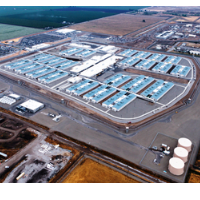Federal Monitor Cites “Serious Risk of Harm,” Blocks Admissions to State's Newest Prison
 California Health Care Facility in Stockton
California Health Care Facility in Stockton
The opening of the nation's largest prison facility for chronically ill and disabled inmates in Stockton last July was an opportunity for corrections officials to show progress in meeting federal court orders to improve health and well-being in California's penal system.
So far, it's a missed opportunity.
J. Clark Kelso, the court-appointed receiver in charge of the state's prison health-care system since 2006, halted the admission of any more inmates to the 1,722-bed facility until his complaints have been addressed. “Of greatest concern,” Kelso wrote in his report released last week, “were systemic and prison-wide failures that continue to pose a serious risk of harm—and deny basic rights—to the 1,200-plus prisoners (and 550-plus Armstrong class members) housed there.”
The 54-building California Health Care Facility (CHCF) provides care for inmates who require acute and long-term care for medical reasons. The complex includes a diagnostic center, a dental clinic and dialysis units for diabetics.
An 1,133-bed mental health annex, scheduled to open in April, will not, Kelso said.
Kelso listed eight general areas, and cited numerous individual instances, of failure at the 54-building, $839 million complex:
· The vast majority of the 2,298 staff members don't have required training in multiple areas.
· Basic supplies for hygiene are lacking, including diapers and catheters that aren't the wrong size. Towels, soap, band-aids and state-issued clothing are all in short supply.
· Staff does not respond in a timely fashion. The report topped off a list of examples with the recent death of an inmate who complained of bleeding for days. He pressed the Call button 30 minutes before staff found him unconscious and, perhaps, already dead.
· An audiologist is on-site just once a month and can't see all the inmates who need evaluations. Consequently, a bunch of them can't get their hearing aids fixed or replaced. A TDD machine is often inaccessible and other basic supplies, like hearing-aid batteries, aren't always available.
· A couple dozen prisoners said their wheelchairs were broken. Others had their mobility restricted for lack of walkers, glasses or prosthetic limb parts.
· Those with working wheelchairs were restricted by visiting-room doors that were too narrow to accommodate them.
· The library is without basic equipment for people with vision impairments and other disabilities. One prisoner who requested assistance was given a typewriter, but no ribbon, and promised an electric magnifying glass that never arrived.
There was no indication when admissions might resume.
–Ken Broder
To Learn More:
Stockton Medical Prison Unsanitary, Inadequate (by Jennie Rodriguez-Moore, Stockton Record)
Stockton Prison Hospital Halts Admissions (by Bob Egelko, San Francisco Chronicle)
Admissions Closed in California's Newest Prison (by Paige St. John, Los Angeles Times)
Judge Adds Probe of State Mental Health Facilities to Ongoing Scrutiny of Prisons (by Ken Broder, AllGov California)
California Health Care Facility, Stockton (California Department of Corrections and Rehabilitation)
CHCF Armstrong Monitoring Visit (Prison Law Office)
- Top Stories
- Controversies
- Where is the Money Going?
- California and the Nation
- Appointments and Resignations
- Unusual News
- Latest News
- California Forbids U.S. Immigration Agents from Pretending to be Police
- California Lawmakers Urged to Strip “Self-Dealing” Tax Board of Its Duties
- Big Oil’s Grip on California
- Santa Cruz Police See Homeland Security Betrayal in Use of Gang Roundup as Cover for Immigration Raid
- Oil Companies Face Deadline to Stop Polluting California Groundwater





